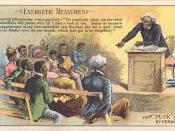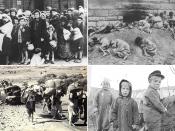Modern scholarship typically differentiates utilitarian ethnic cleansing from ideological ethnic cleansing. Pre-twentieth-century acts of ethnic cleansing typically were of the utilitarian type, in which perpetrators were pursuing land, economic wealth, slaves, or simply settling old scores. Modern ethnic cleansing, however, tends to be ideological, whereby the perpetrator proceeds for reasons having to do with race, ethnicity, religion, politics, or some other ideological factor. In most cases, the ideology underpinning an ethnic cleansing is complex; rarely can it be traced solely to religious, political, ethnic, racial, or economic reasons. It is often a combination of some or all of these.
The key to 20th century secessionism lies in transnational phenomena, usually referred to as organizations, institutions, networks, etcetera. These terms are vague too, and in many cases give a wrong idea of ongoing events. For the transnational phenomena referred to I prefer the term regime, in political science used for structures that surpass the boundaries of the state.
A widely used definition of the term is Krasner's. According to Krasner a regime consists of: 'implicit or explicit principles, norms, rules and decision-making procedures around which actors' expectations converge in a given area of international relations. (Krasner 1983)'
For political scientists the concept is indeed closely tied to international relations, to relationships between states or state governments. The restriction to international relations is under emerging political realities not practical: many transnational regimes came into being without much state interference, and may even turn themselves against the state. The point is that in the context of secessionism we are not dealing with international regimes but with transnational ones: regimes that transcend states, and do not depend on relationships or agreements between states. Departing from Krasner I would define a regime as consisting of
more or less strongly formalized and institutionalized constellations...


